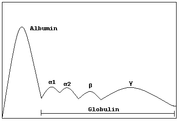
Alpha globulin
Encyclopedia

Globular protein
Globular proteins, or spheroproteins are one of the two main protein classes, comprising "globe"-like proteins that are more or less soluble in aqueous solutions...
s in plasma
Blood plasma
Blood plasma is the straw-colored liquid component of blood in which the blood cells in whole blood are normally suspended. It makes up about 55% of the total blood volume. It is the intravascular fluid part of extracellular fluid...
, which are highly mobile in alkaline or electrically charged solutions. They inhibit certain blood protease
Protease
A protease is any enzyme that conducts proteolysis, that is, begins protein catabolism by hydrolysis of the peptide bonds that link amino acids together in the polypeptide chain forming the protein....
and inhibitor activity.
Alpha 1 globulins
- α1-antitrypsinAlpha 1-antitrypsinAlpha 1-Antitrypsin or α1-antitrypsin is a protease inhibitor belonging to the serpin superfamily. It is generally known as serum trypsin inhibitor. Alpha 1-antitrypsin is also referred to as alpha-1 proteinase inhibitor because it inhibits a wide variety of proteases...
- Alpha 1-antichymotrypsinAlpha 1-antichymotrypsinAlpha 1-antichymotrypsin is an alpha globulin glycoprotein that is a member of the serpin superfamily.It inhibits the activity of certain enzymes called proteases, such as cathepsin G that is found in neutrophils, and chymases found in mast cells, by cleaving them into a different shape or...
- OrosomucoidOrosomucoidOrosomucoid or alpha-1-acid glycoprotein is an acute phase plasma alpha-globulin glycoprotein and is modulated by two polymorphic genes. It is synthesized primarily in hepatocytes and has a normal plasma concentration between 0.6-1.2 mg/mL...
(acid glycoproteinGlycoproteinGlycoproteins are proteins that contain oligosaccharide chains covalently attached to polypeptide side-chains. The carbohydrate is attached to the protein in a cotranslational or posttranslational modification. This process is known as glycosylation. In proteins that have segments extending...
) - Serum amyloid ASerum amyloid ASerum amyloid A proteins are a family of apolipoproteins associated with high-density lipoprotein in plasma. Different isoforms of SAA are expressed constitutively at different levels or in response to inflammatory stimuli . These proteins are produced predominantly by the liver...
- Alpha 1-lipoprotein
Alpha 2 globulins
- HaptoglobinHaptoglobinHaptoglobin is a protein that in humans is encoded by the HP gene. In blood plasma, haptoglobin binds free hemoglobin released from erythrocytes with high affinity and thereby inhibits its oxidative activity. The haptoglobin-hemoglobin complex will then be removed by the reticuloendothelial system...
- Alpha-2u globulin
- α2-macroglobulinAlpha 2-macroglobulinalpha-2-Macroglobulin, also known as α2-macroglobulin and abbreviated as α2M and A2M, is a large plasma protein found in the blood. It is produced by the liver, and is a major component of the alpha-2 band in protein electrophoresis....
- CeruloplasminCeruloplasminCeruloplasmin is a ferroxidase enzyme that in humans is encoded by the CP gene.Ceruloplasmin is the major copper-carrying protein in the blood, and in addition plays a role in iron metabolism. It was first described in 1948...
- Thyroxine-binding globulinThyroxine-binding globulinThyroxine-binding globulin binds thyroid hormone in circulation. It is one of three proteins responsible for carrying the thyroid hormones thyroxine and 3,5,3’-triiodothyronine in the bloodstream. Of these three proteins, TBG has the highest affinity for T4 and T3, but is present in the lowest...
- Alpha 2-antiplasminAlpha 2-antiplasminAlpha 2-antiplasmin is a serine protease inhibitor responsible for inactivating plasmin, an important enzyme that participates in fibrinolysis and degradation of various other proteins...
- Protein CProtein CProtein C, also known as autoprothrombin IIA and blood coagulation factor XIV, is a zymogenic protein, the activated form of which plays an important role in regulating blood clotting, inflammation, cell death and maintaining the permeability of blood vessel walls in humans and other animals...
- Alpha 2-lipoprotein
- Angiotensinogen

